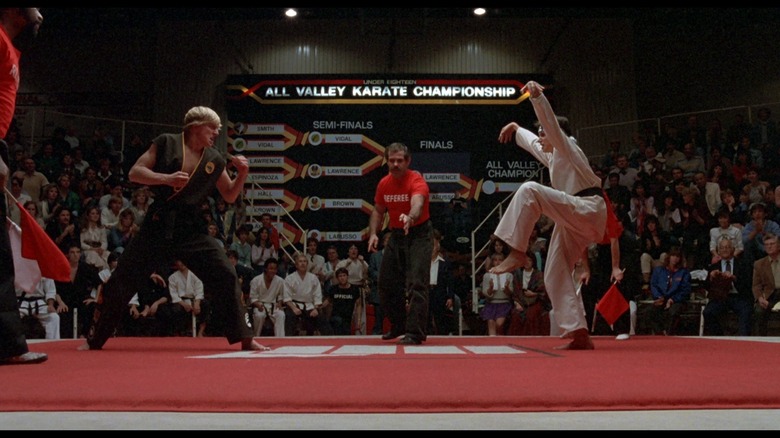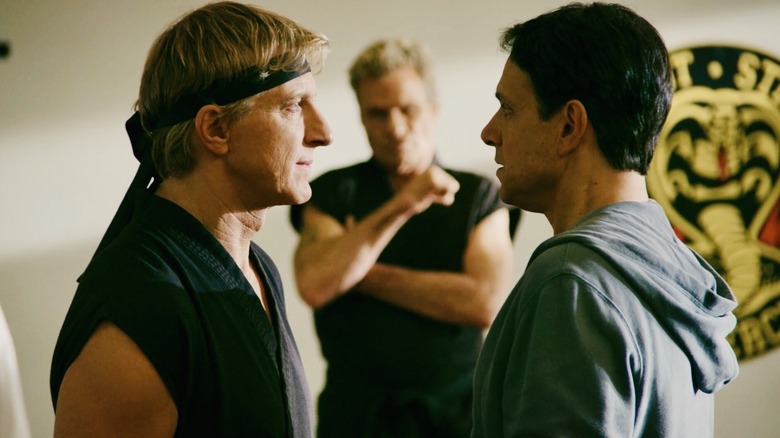
Balance isn’t just something that martial arts virtuoso Mr. Miyagi (the late, legendary Noriyuki “Pat” Morita) likes to harp about to his students in the “Karate Kid” franchise; it’s also crucial to what makes the property tick. Director John G. Avildsen and writer Robert Mark Kamen’s original 1984 “Karate Kid” film established the template for the movies and shows that followed, mixing the gritty realism of Avildsen’s other sports classic, “Rocky,” with lively martial arts fights and borderline cartoonish antagonists. At their best, these tales of troubled, scrappy teenage underdogs studying karate under the tutelage of Miyagai and his disciples are rousing coming-of-age sagas capable of presenting heavy subject matter in a crowd-pleasing package. At their worst, they still offer invaluable life lessons, even when they veer into the realm of self-parody.
On the whole, “Karate Kid” enthusiasts tend to agree about the franchise’s high and low points. The original “Karate Kid” is still generally regarded as the gold standard on the movie side, while the 2010 “Karate Kid” reboot — a film that will officially be retconned as being part of the greater “Miyagi-verse” in the, at the time of writing, upcoming “Karate Kid: Legends” — is mostly looked on as a slicker and less effective but otherwise respectable retread (despite it being about kung fu and not, y’know, karate). On the opposite end of the spectrum, “The Karate Kid Part III” was the tipping point where the property somehow became too deadly serious and utterly ridiculous at the same time. Then there’s the red-headed stepchild that is the Hilary Swank-starring 1994 soft reboot “The Next Karate Kid,” which is better than its unflattering reputation would suggest.
If we use IMDb ratings as our guiding light, though, there’s one entry in the Miyagi-verse that crane-kicks higher than all the rest — namely, a TV show that features many of the same tropes as your average anime series. But am I referring to the 1989 “Karate Kid” cartoon or “Cobra Kai?”
IMDb users agree: Cobra Kai is the best around
“Cobra Kai” creators Josh Heald (writer of the “Hot Tub Time Machine” movies), and Jon Hurwitz & Hayden Schlossberg (the scribes behind the “Harold & Kumar” films) have a flair for taking bad ideas and working wonders with them. Case in point: a “Karate Kid” legacy sequel series centering on golden locks-adorned “Karate Kid” bad boy Johnny Lawrence (William Zabka) as a middle-aged washout doesn’t exactly read like a surefire winning recipe. And yet, from its very first episode (back when it was, amazingly, a YouTube Red original), “Cobra Kai” moves with such confidence that it’s practically impossible not to get sucked in.
IMDb users agree, as evidenced by the fact that “Cobra Kai” holds a franchise-high average score of 8.4 on the website based on some 218,000 votes, with the 1984 “Karate Kid” coming in second place with a 7.3 rating from 254,000 tallies. The thing that really makes the show tick is its ability to honor the property’s long-standing theme about karate being indicative of how one lives their life (and vice versa) while also painting its interpersonal conflicts in deeper shades of grey than the previous “Karate Kid” movies ever did. That and its high-flying martial arts action, which is almost “John Wick”-like in the way it depicts people (usually teens!) beating the stuffing out of one another through elaborate choreography and dynamic camerawork that actually lets you see what’s happening.
Like Avildsen’s “Karate Kid” trilogy, “Cobra Kai” also gets more ludicrous the further along it goes … which, in this case, is a good thing. Indeed, in the years since it was acquired by Netflix, the series has basically become a live-action sports anime, with characters obsessing over maxing their “power levels” (re: getting better at karate), teen melodrama up the wazoo, and more soapy operatics involving people switching alignments than a “Fast & Furious” sequel. Though it all, “Cobra Kai” somehow finds equal room for both sincere drama and self-aware levity, poking fun at itself even as it plays the sound of a hawk caw every time a mohawked teenager nicknamed “Hawk” (Jacob Bertrand) charges into battle without batting an eye. Maybe Mr. Miyagi was onto something with all that talk of balance after all.
“Cobra Kai” is streaming on Netflix.



Leave a Reply